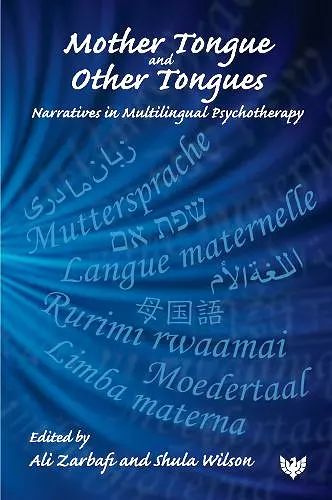Mother Tongue and Other Tongues
Narratives in Multilingual Psychotherapy
Ali Zarbafi editor Shula Wilson editor
Format:Paperback
Publisher:Karnac Books
Published:28th Jul '21
Should be back in stock very soon

This insightful book explores the deep connections between language, identity, and culture, highlighting the experiences of therapists and their patients. Mother Tongue and Other Tongues offers valuable perspectives.
In Mother Tongue and Other Tongues, the exploration of language's significance in shaping identity, culture, and the concept of 'home' takes center stage. This book delves into the personal narratives of therapists hailing from Europe, Asia, and Africa, shedding light on the profound impact of multilingualism in their lives and practices. Through their experiences with patients from diverse backgrounds, the authors highlight the intricate relationship between language and identity, emphasizing the therapeutic value of understanding one's linguistic roots.
The narrative unfolds against a backdrop of contemporary issues surrounding identity and difference, which have become increasingly polarized. As society grapples with an inward-looking nostalgia for sameness, the complexities of hearing and speaking different languages grow more pronounced. The book examines how these complexities are often intertwined with feelings of powerlessness, fear, and survival, illustrating how the act of communication is not just about words but also about navigating the emotional landscapes of belonging and cultural history.
Mother Tongue and Other Tongues presents a rich tapestry of reflections from various contributors, including therapists, academics, and artists, all of whom share their insights on the multifaceted role of language. Through their stories and memories, the book invites readers to consider the therapeutic implications of language and the ongoing journey of the Multi-lingual Psychotherapy Centre (MLPC), which has been dedicated to this exploration for over two decades.
In old Vienna, Sigmund Freud treated his very first patients, all of whom lived nearby, in his native German tongue. But, today, psychotherapy has become a far more globally diversified practice, both culturally and linguistically, posing many challenges and opportunities. In this wonderfully rich and readable book, Ali Zarbafi and Shula Wilson have assembled a magnificent collection of colleagues from Canada, France, Germany, Iran, Israel, Japan, the United States of America, and Zimbabwe, to examine the nature of multilingual psychotherapy from the perspective of both the patient and the clinician. I devoured this book in one sitting and I recommend it very highly indeed.
-- Professor Brett Kahr, Senior Fellow, Tavistock Institute of Medical Psychology, London, and Visiting Professor of Psychoanalysis and Mental Health, Regent’s University London‘Speaking a language is an emotional experience,’ states Ali Zarbafi at the beginning of this book. Speaking multiple languages is increasingly the norm across the world. So why has the multilingual experience been left in the shadows of psychotherapy practice for so long? Mother Tongue and Other Tongues, edited by Ali Zarbafi and Shula Wilson, boldly and truthfully examines the profoundly important, although neglected, experience of the multilingual client in psychotherapy theory and practice. The book is a collection of chapters (developed from the Burgh House lectures) written by practising multilingual psychotherapists. These chapters make the compelling case that we experience the world differently according to the languages we speak or hear throughout our lives. Each beautifully written chapter starts with the author’s autobiographical narrative, interwoven with case vignettes and examples from theory, novels, poetry, and music. The themes of identity, home, displacement and exile, dreams, mother tongues and father tongues, loss, attachment, transgenerational gifting or withholding of languages, intimacy, emotional engagement and distance and the processing of trauma – are all considered through the multilingual frame. Each chapter is a story in its own right. The book is written in English which is the mother tongue of only a few of the contributors. Perhaps for that reason the writing is so compelling – each word chosen with care and respect for the inherent power of language. Each page is saturated with the truth of the experiences shared and reflected upon by the authors. Mother Tongue and Other Tongues takes the reader deep into the multilingual experience. It shows us that if we ignore the multilingual emotional experiences of our clients, we do not really see them. This book makes a powerful case for the multilingual experience to be incorporated into contemporary psychotherapy thinking and practice.
-- Dr Beverley Costa, DPsych, UKCP-approved supervisor, MBACP, Senior Practitioner Fellow, Birkbeck, University of London , Director, the Pásalo Project, www.pasaloproject.orgThis is an exciting and topical book, written with great elegance, that demands to be read. Ali Zarbafi and Shula Wilson have edited a series of moving and thoughtful chapters, written by authors, all psychotherapists, exploring what it is like to speak and work in a second language that is not their mother tongue. The authors’ personal experiences of exile, dislocation, and then adaptation into a new culture will be an invaluable resource for those working with or living alongside people from other cultures and how to communicate with them.
-- Jan Wiener, Training Analyst and Supervisor, Society of Analytical Psychology, London‘this book spoke volumes to me; particularly the delicate sensitivity and authenticity with which the authors re-consider the collective experience of loss, trans-generational trauma and resilience whilst bringing out ‘the gifting’ of the deeper understanding that difference and cross-cultural meetings can bring. […] this will not only be a welcome resource for counsellors and psychotherapists who work with the multilingual experience in all its shapes, but also for anyone curious about, or confronted with this topic.’
-- Alice Hartmann, Integrative Psychotherapist (UKCP), in SCAP News No.142,ISBN: 9781912691852
Dimensions: 229mm x 152mm x 10mm
Weight: 294g
166 pages